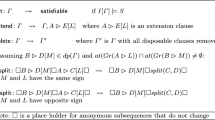Abstract
This paper constitutes the second part of a paper published in the Journal of Automated Reasoning 18 (1997), 357–398.
The minimal entailment ⊢ M i n has been characterized elsewhere by P ⊢ M i n ϕ iff C n(P ∪{ϕ}) ∩ G P o s C n(P), where C n is the first-order consequence operation, P is a set of clauses (disjunctive logic program; in short: a program), ϕ is a clause (a query), and G P o s is the set of positive (that is, bodiless) ground clauses. In this part, we address the problem of computational feasibility of certain iterative applications of criterion (1).
In the first part of the paper we proposed a query evaluation algorithm that decided P ⊢ M i n ϕ by what we called indefinite modeling. The query evaluation algorithm was capable of deciding the right-hand side of (1) without actually computing all ground positive consequences of P or P ∪{ϕ}. The objective of the second part of the paper is to extend the proposed approach so that it properly captures phenomena associated with allowing negation in clauses" bodies, however, at a price of substantial complication (in particular, computing all ground positive consequences of P ∪{ϕ} that are not consequences of P can no longer be avoided). For that purpose, we introduce the concepts of a layered program and its hierarchically minimal semantics, a special case of which covers stratified programs with semantics defined by second-order prioritized circumscription and, in the case of definite programs, perfect models. We characterize the hierarchically minimal entailment ⊢ H M i n in terms of iterative application of the right-hand side of criterion (1). Finally, we generalize the indefinite modeling and query evaluation algorithms presented in Part I over the layered programs, and indicate their computational advantages relative to other methods (e.g., those based on prefect model semantics). The presented approach does not require assigning different meanings to logically equivalent clauses, so it actually eliminates the need for program clauses with negation in their bodies.
Similar content being viewed by others
References
Apt, K. R., Blair, H. A. and Walker, A.: Towards a theory of declarative knowledge, in Minker, J., (ed.): [14], 1988, pp. 89–142.
Aczel, P.: An introduction to inductive definitions, in Barwise, J. (ed.): [3], Chapter C.7, 1978, pp. 739–782.
Barwise, J. (ed.): Handbook of Mathematical Logic, 2nd edn, North-Holland, Amsterdam, 1978.
Bossu, G. and Siegel, P.: Saturation, nonmonotonic reasoning, and the closed world assumption, Artif. Intell. 25(1) (1984), 13–64.
Clark, K. L.: Negation as failure, in H. Gallaire and J. Minker (eds.), Logic and Data Bases, Plenum Press, 1978, pp. 55–76.
Etherington, D. W., Mercer, R. E. and Reiter, R.: On the adequacy of predicate circumscription for closed-world reasoning, Comput. Intell. 1(1) (1985), 11–15.
Fitting, M.: First-Order Logic and Automated Theorem Proving, Springer-Verlag, 1990.
Van Gelder, A.: Negation as failure using tight derivations for general logic programs, in Minker, J., (ed.): [14], 1988, pp. 19–88.
Gelfond, M., Przymusińska, H. and Przymusiński, T. C.: On the relationship between circumscription and negation as failure, Artif. Intell. 38 (1989), 75–94.
Keisler, H. J.: Fundamentals of model theory, in Barwise, J. (ed.): [3], Chapter A.2, 1978, pp. 47–104.
Kunen, K.: Combinatorics, in Barwise, J. (ed.): [3], Chapter B.3, 1978, pp. 371–401.
Lifschitz, V.: Computing circumscription, in Proceedings of Eight International Joint Conference on Artificial Intelligence, Los Angeles, 1985, pp. 121–127.
Lloyd, J. W.: Foundations of Logic Programming, 2nd extended edn, (Symbolic Computation. Artificial Intelligence), Springer-Verlag, New York, edn, 1987.
Minker, J., (ed.): Foundations of Deductive Databases and Logic Programming, Morgan Kaufmann, Los Altos, 1988.
Reiter, R.: On closed world data bases, in H. Gallaire and J. Minker (eds.), Logic and Data Bases, Plenum Press, 1978, pp. 55–76.
Suchenek, M. A. and Sunderraman, R.: Minimal models for closed world data bases with views, in Z. W. Ras (ed.), Methodologies for Intelligent Systems 5, North-Holland, New York, 1990, pp. 182–193.
Suchenek, M. A. and Sunderraman, R.: On negative information in deductive data bases, J. Database Administration 1 (1990), 28–41. An invited paper.
Suchenek, M. A.: Forcing versus closed world assumption, in Z. W. Raś and M. Zemankova, (eds.), Methodologies for Intelligent Systems, North-Holland, 1987, pp. 453–460.
Suchenek, M. A.: Incremental models of updating data bases, in C. H. Bergman, R. D. Maddux, and D. L. Pigozzi (eds.), Algebraic Logic and Universal Algebra in Computer Science, Lecture Notes in Comput. Sci. 425, Ames, June 1-4, Springer-Verlag, 1988, pp. 243–271.
Suchenek, M. A.: Applications of Lyndon homomorphism theorems to the theory of minimal models, Internat. J. Found. Comput. Sci. 1(1) (1990), 49–59.
Suchenek, M. A.: Alternative computations of minimal consequences in indefinite deductive data bases, in Informal Proceedings of 2nd Workshop on Structural Complexity and Recursion-theoretic Methods in Logic Programming, International Logic Programming Symposium, Vancouver, British Columbia, Canada, October 29, MSI Cornell University, 1993, pp. 187–204.
Suchenek, M. A.: First-order syntactic characterizations of minimal entailment, domain minimal entailment, and Herbrand entailment, J. Automated Reasoning 10 (1993), 237–263.
Suchenek, M. A.: Preservation properties in deductive databases, Methods of Logic in Comput. Sci., an Internat. J. 1 (1994) 315–338. An invited paper.
Suchenek, M. A.: Evaluation of queries under the closed-world assumption, J. Automated Reasoning 18 (1997), 357–398.
Rights and permissions
About this article
Cite this article
Suchenek, M.A. Evaluation of Queries under Closed-World Assumption. Part II: The Hierarchical Case. Journal of Automated Reasoning 25, 247–289 (2000). https://doi.org/10.1023/A:1006319819647
Issue Date:
DOI: https://doi.org/10.1023/A:1006319819647




